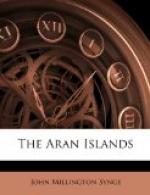He is said to be dying.
Yesterday—a Sunday—three young men rowed me over to Inisheer, the south island of the group.
The stern of the curagh was occupied, so I was put in the bow with my head on a level with the gunnel. A considerable sea was running in the sound, and when we came out from the shelter of this island, the curagh rolled and vaulted in a way not easy to describe.
At one moment, as we went down into the furrow, green waves curled and arched themselves above me; then in an instant I was flung up into the air and could look down on the heads of the rowers, as if we were sitting on a ladder, or out across a forest of white crests to the black cliff of Inishmaan.
The men seemed excited and uneasy, and I thought for a moment that we were likely to be swamped. In a little while, however I realised the capacity of the curagh to raise its head among the waves, and the motion became strangely exhilarating. Even, I thought, if we were dropped into the blue chasm of the waves, this death, with the fresh sea saltness in one’s teeth, would be better than most deaths one is likely to meet.
When we reached the other island, it was raining heavily, so that we could not see anything of the antiquities or people.
For the greater part of the afternoon we sat on the tops of empty barrels in the public-house, talking of the destiny of Gaelic. We were admitted as travellers, and the shutters of the shop were closed behind us, letting in only a glimmer of grey light, and the tumult of the storm. Towards evening it cleared a little and we came home in a calmer sea, but with a dead head-wind that gave the rowers all they could do to make the passage.
On calm days I often go out fishing with Michael. When we reach the space above the slip where the curaghs are propped, bottom upwards, on the limestone, he lifts the prow of the one we are going to embark in, and I slip underneath and set the centre of the foremost seat upon my neck. Then he crawls under the stern and stands up with the last seat upon his shoulders. We start for the sea. The long prow bends before me so that I see nothing but a few yards of shingle at my feet. A quivering pain runs from the top of my spine to the sharp stones that seem to pass through my pampooties, and grate upon my ankles. We stagger and groan beneath the weight; but at last our feet reach the slip, and we run down with a half-trot like the pace of bare-footed children.
A yard from the sea we stop and lower the curagh to the right. It must be brought down gently—a difficult task for our strained and aching muscles—and sometimes as the gunnel reaches the slip I lose my balance and roll in among the seats.
Yesterday we went out in the curagh that had been damaged on the day of my visit to Kilronan, and as we were putting in the oars the freshly-tarred patch stuck to the slip which was heated with the sunshine. We carried up water in the bailer—the ‘supeen,’ a shallow wooden vessel like a soup-plate—and with infinite pains we got free and rode away. In a few minutes, however, I found the water spouting up at my feet.




